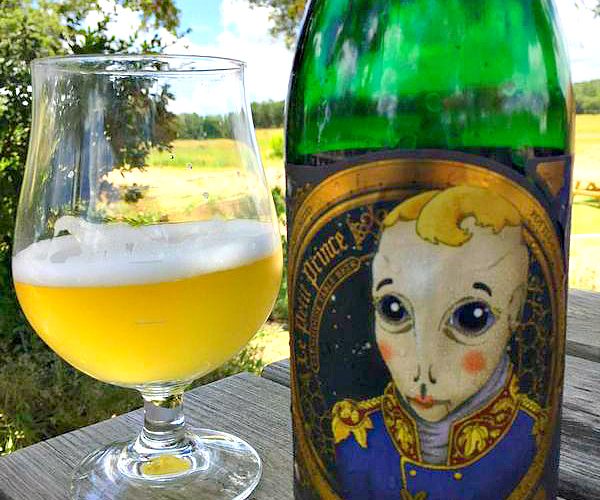Earlier this year, we began experimenting with packaging some of our beer in green bottles. We started by taking a portion of our February batch of Le Petit Prince Farmhouse Table Beer, and naturally conditioning it in bottles like the one seen in the photo above. After three months of conditioning, we’re quite pleased with the results! We started selling “green bottle Le Petit Prince” in our tasting room this past weekend, and we plan on packaging some of our upcoming batches of Noble King and Mad Meg in green bottles. We’re excited to see where this experimentation takes us! For now, Le Petit Prince in green bottles is only available at our tasting room, and we still have Le Petit Prince available in brown bottles like before.
So why are we doing this?
Here’s our Head Brewer Garrett Crowell’s explanation:
“My pursuit of the use of green bottles stems mostly from the character of all of my favorite beers. Cuvee de Jonquilles, Blaugies, Thiriez, Fantôme, Cantillon, Dupont, all use green bottles. I’ve had brown bottle versions of some of these beers, and have had them on draft as well and there is an element missing from those versions that the green bottles have. While green bottles permit the risk of light struck/skunky character, I feel they add character, even beyond skunkiness. So many breweries have attempted to mimic the classic Saison Dupont yeast profile, and I feel what is most often missing is the light struck character that is integral to the profile of that beer.
Beer is as delicate as wine. Pasteurized, shelf stable beer has dumbed down beer consumers into believing that something will still taste fresh after leaving it in the trunk of their car, or in the sun, etc. Hopefully, green bottles will emphasize that our beer is a living thing, and that the way it’s treated will significantly alter the experience one can have with it.
I feel that beer is losing individuality through structure, and the expectation to fulfill guidelines. I absolutely like skunky beer, oxidized beer, or “flawed” beer. We allow our beer to pick up “peripheral” character that deviates from guidelines, whether it’s a bit of oak, Brettanomyces, or lactic acidity. Horse barn, goat sweat, and brett character are embraced, yet skunkiness is considered a flaw. If the way I create, and eventually package a beer renders it unfit for BJCP guidelines, then I consider that a success and furtherance of creativity. I feel as though the status quo of brewing is to find a set of guidelines, create a product that fits within them, enter a competition, and receive an award. It reminds me of standardized testing from grade school. Students spend half the year learning how to take a test, and creativity is suppressed for the sake of passing test scores.
I understand that green bottles and light struck character are going to be a challenge for most beer enthusiasts. I think we’re in a unique and important position to break down some of the indoctrination that is present and document something truly beautiful and unique.”
— Jester King Head Brewer Garrett Crowell

Share Post